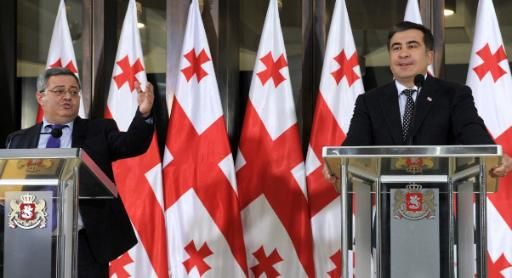
Georgia and the United States: De-Alignment Through Regime Change? (Part Two)
Publication: Eurasia Daily Monitor Volume: 10 Issue: 50
By:

The Barack Obama administration publicly called for an “orderly transfer of power” during Georgia’s electoral campaign. President Obama first gave this message, publicly and (still more explicitly) privately, to the visiting Georgian president Mikheil Saakashvili as early as January 2012 in Washington. “Orderly transfer of power” became a recurrent talking point—indeed, a normative point for US officials in the run-up to Georgia’s parliamentary elections.
That seemed somewhat incongruous, given the timing. Washington was already on record as rejecting a switch by Saakashvili from president to prime minister (or any leadership role) when his second presidential term would run out in October 2013. However, the United States began urging for an orderly transfer of power in the context of the 2012 parliamentary election campaign. This could easily be read as pre-judging the election’s outcome. That reading was not too far off the mark, given that the goal to ease Saakashvili out presupposed holding his United National Movement (UNM) party to less than a constitutional majority in the new parliament.
US officials urged the Georgian government to hold elections “on the highest international standards,” “model elections,” the conduct of which would become a “litmus test” for the Georgian government and Georgia-US relations (see EDM, June 11 and 12, 2012). Washington also urged the government to ensure a “level electoral playing field”; and in the final stage of the campaign it discreetly leaned on the Georgian government to stop enforcing the legal limitations on Georgian Dream’s campaign financing. A level electoral playing field is an unexceptionable benchmark in most circumstances, but it was particularly difficult to realize in Georgia, where the multi-billionaire Bidzina Ivanishvili was capable of outspending the government on his way toward state capture (see EDM, March 8, 12, 14, 2013).
Those exhortations sounded at times like warnings that the United States would distance itself from the Georgian government in the post-election period, unless the government’s conduct of the elections lived up to US-declared expectations. Given Georgia’s history and the current conditions in Georgian society, expecting the government to hold “model” and “highest-standard” elections was both unrealistic and placed an unfair onus on the government (much less on the opposition). A far more productive approach would have been to urge improvements from one electoral cycle to the next, as seen in the 2008 parliamentary elections and the 2010 country-wide local elections, which were recognized in the West as marking steady progress.
Ironically, the Obama administration’s inflated expectations (if taken at face value as professed) echoed the George W. Bush administration’s much-exaggerated portrayal of Georgia as a “beacon of democracy.” The Bush administration meant (in the language of that decade) to give Georgia some credit toward further progress and legitimize US support for the government. The Obama administration, however, seemed to set the bar unreasonably high in a process of distancing itself from the same president and government, all while de-prioritizing Georgia and the region in US policy.
Almost certainly surprised by Ivanishvili’s outright victory, the US government had in any case anticipated a strong showing by him and positioned itself to influence his decisions. US Ambassador Richard Norland (who took up his post in Tbilisi midway through the electoral campaign) held frequent tête-à-tête meetings with Ivanishvili (The Messenger, September 7, 2012)—an effort not only useful but necessary, given Ivanishvili’s lack of political experience, 1990s-type mentality, and unfamiliarity with policy issues (as he was to demonstrate again after the elections). This was an equally necessary form of US leverage-building (albeit without the ambitious strategic goals of earlier US policy). Reportedly, Ivanishvili welcomed this relationship with the ambassador and seemed at least in part receptive to the advice. This is not surprising, given the US de facto role as referee, source of legitimacy, and instance of appeal in Georgia’s internal politics—a role that owed much to the Saakashvili government (see EDM, March 15).
Ivanishvili needed to neutralize US support for the Georgian government in the run-up to the elections and in the post-election period. This was the whole gist of his lobbying efforts in Washington (see EDM, April 4, 2012). He then needed the United States’ blessing following his party’s victory in the elections. Given his background in Russia, continuing business interests there, and one-man-rule ambitions, it was all the more important for Ivanishvili to be seen as receiving US approval. In the event, his electoral victory left the US with no other choice. Even so, Ivanishvili overshot when he insisted on being received by President Obama in Washington in late 2012, and (partly as a result of that insistence) was offered a meeting with Vice President Joseph Biden instead (in Washington or Munich), and apparently deeming this insufficient, cancelled the planned visit to the United States.
US leverage over Ivanishvili seems limited, however. As prime minister he controls the government; as coalition leader he dominates political processes; as party leader he controls the parliamentary majority (he hand-picked his party’s candidates to parliament); as financier he can dispense patronage to interest groups in return for their support, and he is set to nominate his candidate for the upcoming presidential election. The erosion in US leverage may be seen (inter alia) in the failure of efforts to stop the unlawful, forcible takeovers of town and district administrations by Georgian Dream from UNM’s incumbent office holders. This process, unfolding in Georgia’s countryside, is barely being reported, much less eliciting a public response (International Society for Fair Elections and Democracy [ISFED] report, March 2013).
Similarly, Washington’s quiet-diplomacy attempts thus far have not succeeded in stopping the persecution of former government officials. Checks and balances as well as the cohabitation of Ivanishvili with the UNM pending the October 2013 presidential election are US goals that are not working out. The United States’ influence with the new Georgian government seems to be diminishing in proportion with Ivanishvili’s consolidation of power.




